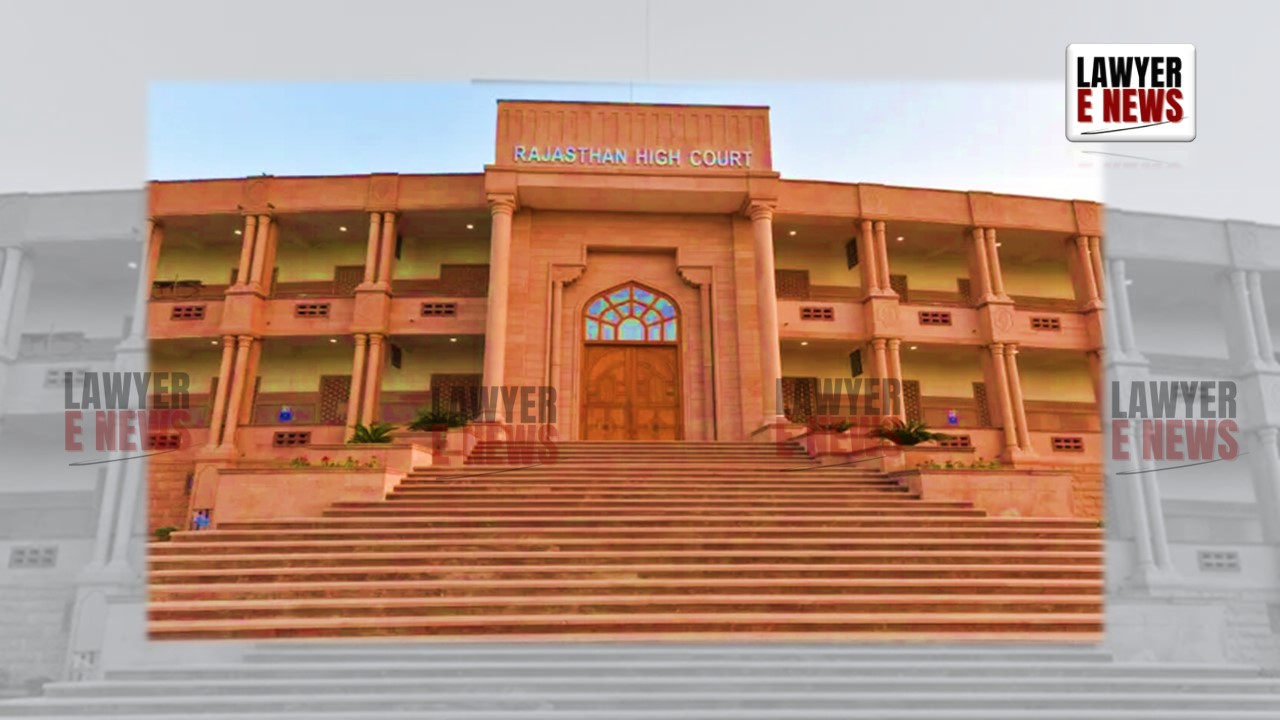-
by Admin
15 February 2026 5:01 PM



"The requirement of prior sanction under Section 19 of the Prevention of Corruption Act and Section 197 CrPC is a safeguard designed to protect public servants from frivolous or malicious prosecutions for acts committed in the discharge of their official duties."
Rajasthan High Court at Jodhpur, presided over by Hon'ble Justice Manoj Kumar Garg, quashed the charges framed against petitioner Kesar Singh under the Prevention of Corruption Act, 1988 (PC Act), and Indian Penal Code, 1860 (IPC). The Court ruled that the framing of charges in the absence of mandatory prosecution sanction under Section 19 of the PC Act and Section 197 of the Code of Criminal Procedure, 1973 (CrPC), was unsustainable.
The case arose from a complaint filed by Narpat Singh with the Anti-Corruption Bureau (ACB), Jaipur, alleging misappropriation of public funds and forgery in connection with the construction of a "Jal Grahan Koop" (water harvesting structure) in Rajiyasar Gram Panchayat. The ACB conducted an investigation and filed a challan against the accused, including Kesar Singh, who was the Sarpanch at the time. Charges were framed against Kesar Singh for offenses under Sections 13(1)(c)(d) and 13(2) of the PC Act, and Sections 409, 467, and 120B of the IPC.
Kesar Singh challenged the framing of charges on the grounds that, as a public servant, he was entitled to protection under Section 19 of the PC Act and Section 197 of CrPC, which mandate prior sanction before prosecuting a public servant for acts committed in the course of their official duties. The petitioner argued that the alleged acts of forgery and misappropriation were reasonably connected to the discharge of his duties as Sarpanch and therefore required prior sanction for prosecution.
Justice Manoj Kumar Garg agreed with these contentions and observed that the trial court had erred in framing charges without prior sanction. The Court emphasized that the requirement for prosecution sanction under Section 19 of the PC Act and Section 197 of CrPC is not a mere procedural formality but a substantive safeguard to protect public servants from vexatious or frivolous prosecutions.
The Court relied on settled legal principles laid down in various precedents, including Dilwar Singh v. Parvinder Singh [(2005) 12 SCC 709] and State of Orissa v. Ganesh Chandra Jew [(2004) 8 SCC 40], which highlight that acts reasonably connected with the discharge of official duties are entitled to the protection of sanction. The Court also referred to earlier judgments of the Rajasthan High Court, such as Prabhu Dayal v. State of Rajasthan (1993 Supreme (Raj.) 523) and Pukhraj v. Ummaidram (AIR 1964 Rajasthan 174), which held that prosecution against public servants, including Sarpanches, cannot proceed without prior sanction if the alleged acts are linked to their official functions.
Justice Garg clarified that the alleged misappropriation and forgery committed by Kesar Singh had a direct and reasonable connection with his official role as Sarpanch. The allegations pertained to his verification of documents, release of funds, and oversight of development projects in the Panchayat. Since these acts were performed under the color of his official duties, prior sanction under Section 197 CrPC and Section 19 of the PC Act was mandatory.
The Court further noted that the prosecution had not obtained any sanction for the prosecution of Kesar Singh, nor had it attempted to do so before filing the chargesheet. In the absence of such sanction, the trial court lacked the jurisdiction to take cognizance of the offenses or to frame charges.
The Court quashed the charges framed against Kesar Singh for offenses under Sections 13(1)(c)(d) and 13(2) of the PC Act, and Sections 409 and 467 IPC, on the ground of non-compliance with the mandatory requirements of sanction. However, the revision petition was dismissed as withdrawn concerning the other co-accused, who were charged under different provisions.
This judgment underscores the critical importance of adhering to statutory safeguards under Section 19 of the PC Act and Section 197 CrPC when prosecuting public servants. It reinforces the principle that acts performed in the course of official duties, or under the pretense of such duties, cannot be subjected to criminal proceedings without prior sanction from the competent authority. By quashing the charges against Kesar Singh, the Rajasthan High Court has reaffirmed the protection afforded to public servants under the law, ensuring that they can perform their official functions without the fear of vexatious or malicious prosecutions.
The Court concluded that the trial court had acted in error by framing charges against Kesar Singh in the absence of prior sanction and set aside the impugned orders. The decision reiterates the necessity of prosecution sanction as a prerequisite for taking cognizance of offenses under the PC Act and for acts reasonably connected to the discharge of official duties under Section 197 CrPC.
The judgment serves as a reminder of the legal safeguards in place to protect public servants from undue harassment and emphasizes the responsibility of courts to ensure strict compliance with statutory requirements before proceeding with criminal cases against government officials.
Date of Decision: December 6, 2024
